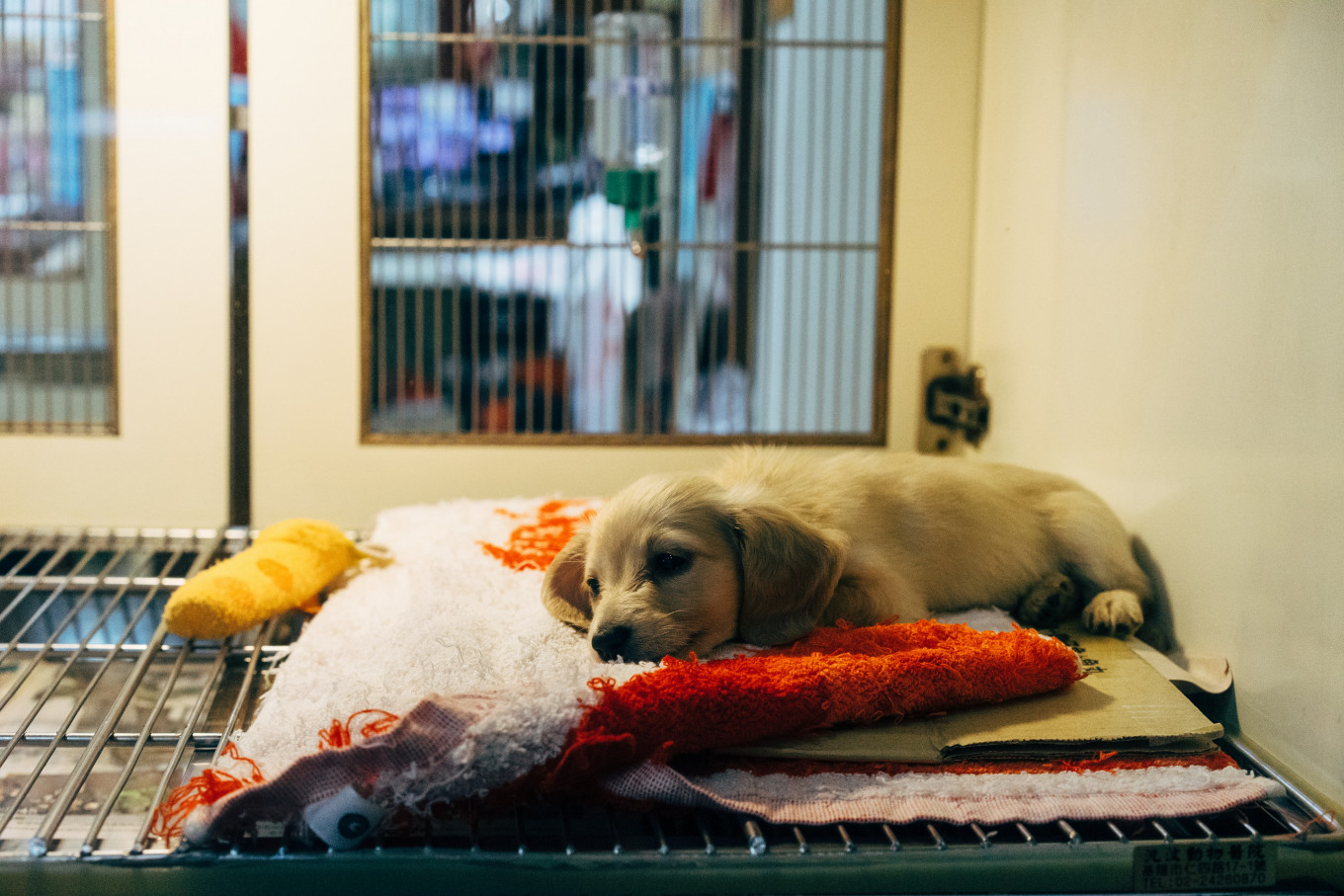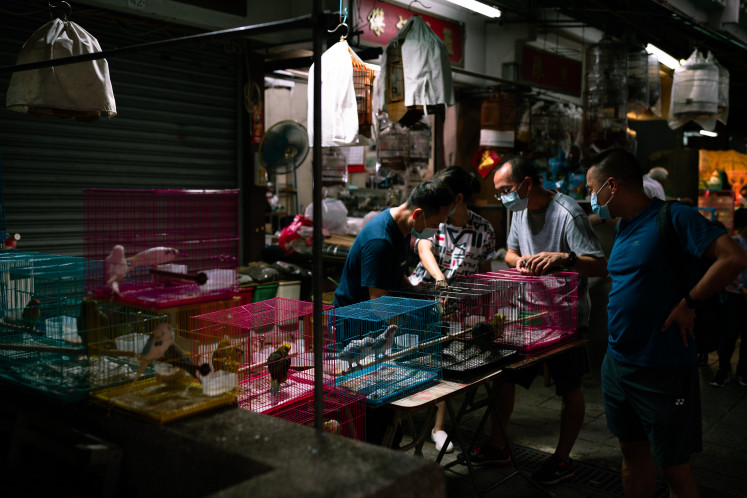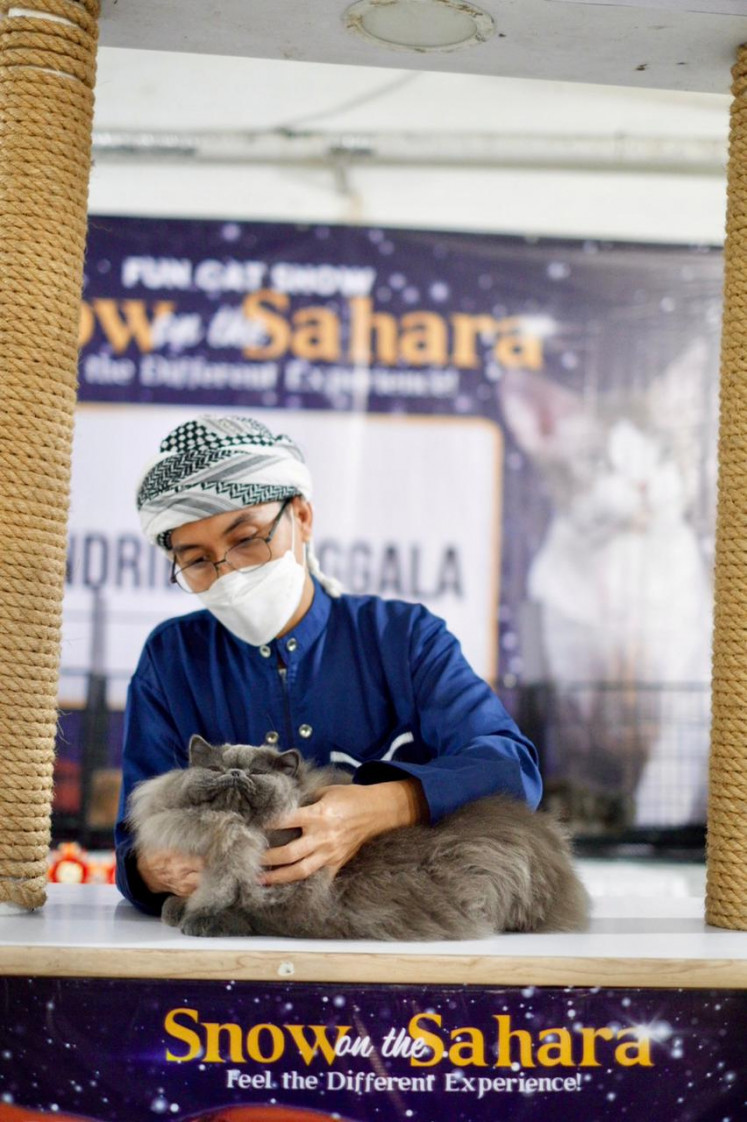Why Indonesia's pet breeding businesses are controversial
From breeding typical domesticated animals such as cats to more exotic creatures like tortoises, the profession has made quite the bank over the years, especially now as people try to bring nature closer to their homes.
Change text size
Gift Premium Articles
to Anyone

O
ften criticized by animal rights activists, pet breeders see their business continue to thrive, especially in bigger cities. From breeding typical domesticated animals such as cats to more exotic creatures like tortoises, the profession has made quite the bank over the years, especially now as people try to bring nature closer to their homes.
Businesses will always have their positives and drawbacks, and the pet breeding business is no different. The industry has thrived, especially after the COVID-19 pandemic hit.
"Pet breeding has indeed been very busy, especially during 2020-2021 — the early part of the pandemic when many people were looking for a business to do at home because they had the opportunity to work from home. For example, just see the booming trend of ornamental fish, such as betta fish, and reptiles such as turtles, geckos and others," said Andrie Kriesniawan, owner of Manggala Cattery in East Jakarta.
The pet breeding business itself, according to Astria Muktihapsari, a vet at Pet Hut Sinau Satwa Citra Raya in Tangerang, is where breeding is done for commercial purposes, by rearing pets for profit.
"Its business activities include the selection [process] by breeders to find superior seeds, arranging the mating activity and supervising or assisting the birth of the litters," she said.

A biased business
Andrie, who established Manggala Cattery in 2010, breeds other kinds of animals in addition to purebred and mixed cats, including tarantulas, leopard geckos, betta fish and guppies. However, according to Andrie, this is just his hobby.
"I won't say that it is a business because if it's a business, it means I gain some sort of monetary profit," he said. "I just have a hobby of raising animals, the advantage for me is just channeling my hobby. Even if I do make money, it goes back to my pets for maintenance costs because apart from breeding, I have also rescued several abandoned kittens."
Pieter Richardo Jawono, a 24-year-old pet enthusiast from Surabaya, shares the same point of view.
"Pet breeders are, in my opinion, people who love animals and want to do it as their business, doing what they love," said Pieter, who has been a compassionate fan of dogs since he was 10 years old.
However, Maria Josephine Kriesye, a cat lover from Surabaya, has a different concern about the business. Pet breeding has its own controversies, such as animal abuse and ecological imbalance.
"To my limited knowledge,… somehow they do some sort of modification to produce a new type of pet, instead of having the mating process carried on naturally," said the 46-year-old.
Andrie refuted this view, saying that most pet breeders did it based on their hobbies because, unlike breeding animals for human food consumption, most of the time, the profit did not cover the costs.
"Take cats, for example. Pet adopters or buyers will choose to look for one that suits their desires and shows good quality, while to get that good quality, [the animals] require the maximum care because apart from health, they also need to be able to show beauty and [high] quality according to their race standards," said Andrie.
"Adopters and buyers always check carefully down to the details such as eye size, eye shape, eye color, fur thickness, tailbone, nose shape, ear size, ear settings, chin shape, muzzle and other [things].”

Ups and downs
Regardless of the love or purity of the business purpose, pet breeders have existed in Indonesia for a long time. But being a pet breeder also comes with several challenges.
"Every business always [has] challenges of its own. For pet breeders, a bad or rainy season can impact the health of their pets and increase the price of [the animal's] food," said Pieter.
"The challenges for me are health problems and insufficient space in my house," said Andrie. However, Andrie also benefits from this. "I get to do my hobbies, gain new experience and knowledge, gain additional insights and make new friends. In fact, my weekend schedule starting from the end of May into September is almost full because I am traveling around Indonesia to be a cat contest judge."
Some pet lovers believe that animals have souls like humans. Caroline Beauty Stacia, 25, a pet enthusiast currently studying in New York, is adamant that animal parents experience heartbreak when separated from their babies, similar to the heartbreaks that humans feel when losing a child.
"The bad thing about the breeding business is the heartbreak of the parents. When we give away puppies for money, it might not mean much for humans, but it'll definitely break the mom's heart," she said. "Most breeders don't care about the conditions of the litters and the parents as long as they get money."
Maria, who believes the pet breeding business is about retrieving the best features from the parental origin, explained the drawbacks that can affect a litter.
"Some monetize the activity [of breeding], and for the sake of selling [an animal that fits] society's preference, they, perhaps, only think of the business [and] profit. A weakling may be born [and removed, then] the weakling suffers abandonment. The defect or ugly animals are considered a failed product."
In that regard, Andrie, who has been venturing from one pet community to the other, said breeders had certain responsibilities to the animals.
"Breeders need to consider the future of their pets by releasing them to responsible people. Because, by changing the hands of ownership, the responsibility for maintenance also changes," he said. "Breeders need to provide guidance and consultations if the new owner has problems with maintenance, such as adapting habits in a new home, as well as recommending veterinarians if there are health problems."

Behind the scenes
Not all pet breeders treat their pets improperly, and some even go the extra mile to ensure the health of their animals. As a pet lover himself, Pieter testified that animals from pet breeders grew to become stronger compared with regular animals.
"I think the pet breeding business can provide healthy, unsusceptible [to illness] and strong animals to sell to customers," he said.
Astria shared this opinion, believing this was usually the case when responsible breeders managed the breeding process. However, she warned new and amateur breeders that each animal had their own appropriate time for mating.
"Helping them to breed is okay, but you shouldn't force it, let alone torture them in the process," she explained. "There are many unscrupulous breeders who like to give their own hormonal drugs [to force mating between animals] without consulting veterinarians. As a result, the dosage is not correct, [which hurts them]."
Sales-wise, as a pet lover and a responsible breeder, Andrie would interview all prospective buyers or adopters of the animals he nurtured to ensure the animals' welfare.
"A responsible breeder will hand over their pet to a prospective owner who is also responsible and caring… However, irresponsible breeders will sell animals to just anyone based on the selling value without looking at the track record of potential buyers," said Andrie. "In fact, there are also those who sell them to pet shops for resale. That means they just wash their hands of the animal's fate."
ohmg









